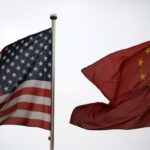In a surprising turn of events that has raised eyebrows across the cryptocurrency sphere, a significant player in the market executed a $735 million short position on Bitcoin just moments before a market downturn linked to former President Donald Trump’s announcement of additional tariffs on China. Online investigations have pinpointed Garret Jin, a Hong Kong businessman and founder of the now-closed crypto exchange BitForex, as the individual behind this substantial bet against Bitcoin.
The timing of Jin’s short position, which occurred approximately 30 minutes before Trump’s tariff declaration on October 10, has ignited speculation regarding the possibility of insider trading. This scrutiny has intensified as Bitcoin’s value plummeted from near $68,000 to below $60,000 following Trump’s announcement, resulting in an estimated profit of around $150 million from Jin’s trade.
The connection to Jin was made by social media user EyeOnChain, who traced the Bitcoin address linked to the short position back to him through previous transactions associated with the ENS domain garrettjin.eth. Jin is a recognized figure in the crypto industry, primarily known for founding BitForex. The exchange, however, closed its doors in 2024 after the unexplained disappearance of about $56 million in customer deposits, though Jin had distanced himself from the platform by then. Other senior executives faced questioning by Chinese authorities during the turmoil but were ultimately released without facing charges.
Despite the allegations, Jin has firmly denied any wrongdoing. In a response to a tweet by Binance founder CZ, who amplified EyeOnChain’s findings to his massive following of over 10 million, Jin remarked, “Thanks for sharing my personal and private information. To clarify, I have no connection with the Trump family or @DonaldJTrumpJr — this isn’t insider trading.” He further asserted that the funds used for the short position were not his but belonged to clients, emphasizing that the trade was not based on insider information but rather on thorough economic analysis.
Jin supports his stance by discussing market trends leading up to the crash, citing visible “overbought signals” in large-cap cryptocurrencies and notable tech stocks. He argued that the prevailing bullish sentiment overlooked the escalating trade tensions between the U.S. and China, which had been evident for several days prior to Trump’s warning. “We cannot predict when President Trump may retaliate against China, but our internal quantitative system has already raised risk alerts,” Jin explained, positioning his actions as informed and strategically calculated rather than deceitful.
As the cryptocurrency community continues to digest these developments, the implications of Jin’s high-stakes gamble and the surrounding controversies could have lasting effects on market perceptions and regulatory scrutiny in the crypto space.







